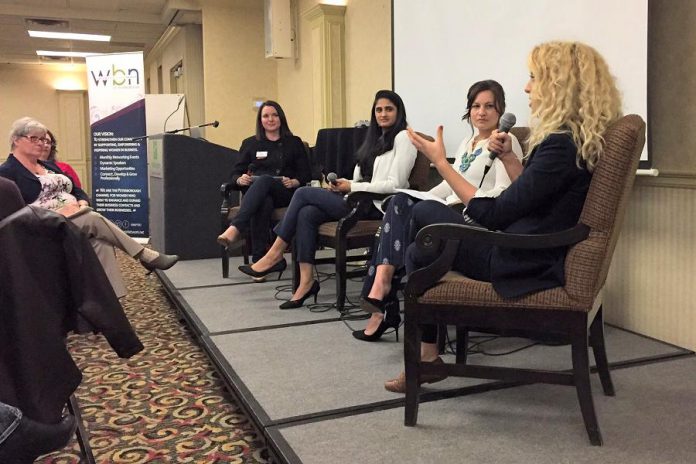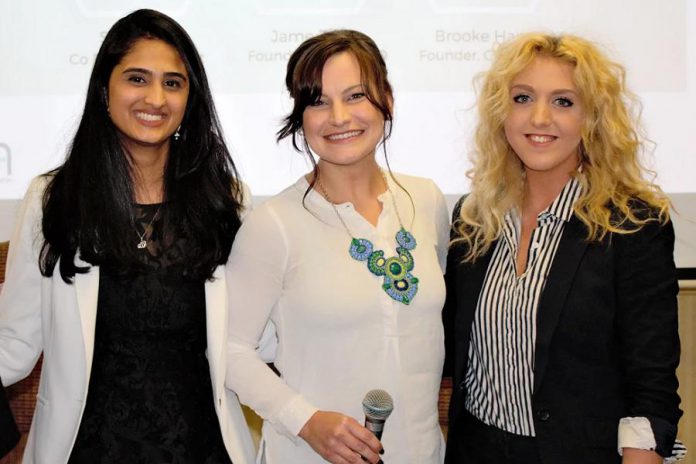
Meet Jane Zima, the 20-something founder of SimbiH2O, a Canadian company providing digital support for water and wastewater management.
When Zima walks into a government-relations committee meeting, she invariably is the youngest woman to ever sit at the table — let alone chair the meeting. Add the topic of using digital solutions to manage water resources (Zima’s goal is to change the way companies and people view water by creating simpler digitized methods for reporting data), and Zima offers the typical perception.
“‘You are a little lady’,” she relates. “That’s all they see and hear. It’s almost like I haven’t earned my spot at the table.”
While it’s true Zima’s background is not in water management (her education is in psychology and nutrition with a topping of microbiology and environmental law), she says the immediate dismissal of many young female entrepreneurs is more deeply rooted in social culture.
“It takes a lot of intelligent conversation to be taken seriously,” she adds. “You have to be feisty. You have to be scrappy.”
Zima was one of three female entrepreneurs under the age of 30 speaking to members and guests at the Women’s Business Network of Peterborough (WBN) on Wednesday evening (May 3) at the Holiday Inn Peterborough Waterfront.

The panel, hosted by WBN board member Paula Kehoe, was entitled “Watch Out World” and featured a panel discussion with the three female leaders of innovative Peterborough startups.
Like Zima, Sana Virji had a similar experience when she and the male cofounder of her business — a hyperlocal digital couponing mobile app called Ribbet — attended an investor meeting.
“The investor invariably would immediately look to my partner to shake his hand,” Virji recalls. “She’s young. She’s female. That’s all they saw.”
After a while, Virji began extending her hand before the investor had a chance to make that mistake again.
Brooke Hammer has also had trouble being taken seriously when she tells a potential investor — usually male — that she wants to “change the way the world snacks” through her vegan ice cream company Chimp Treats.
While Hammer admits it may be a little easier to be a young female entrepreneur in the health food industry, its umbrella sector of agriculture technology is heavily male-dominated.
“I often get the response that ‘Oh, your company’s just adorable,'” Hammer says, adding that she would prefer a response beyond “adorable” — one that might indicate she had the serious consideration of her audience.

The three women, each of them not yet 30 years old, are all trying to change the world — not just within their sector, but also in the way the world sees female business leaders.
Zima, Virji, and Hammer are part of a growing trend toward female entrepreneurship, according to Peterborough & the Kawarthas Economic Development.
Its Business Advisory Centre helped 65 female entrepreneurs under the age of 35 start their businesses last year alone. Many are in the health and wellness sector, retail, or the arts. Only a few, like Zima, are in a traditionally male-dominated field.
The story may soon have a new ending though, as the Innovation Cluster — which supports innovative tech businesses in Peterborough — reports that more than half its membership is comprised of businesses founded by female entrepreneurs.
And, with its higher proportion of women founding tech start-ups, Peterborough may be ahead of the curve when it comes to female entrepreneurship. In a 2015 report, TD economist Leslie Preston writes that, while Canadian women are increasingly opting to pursue an entrepreneurial path and an increasing number have a post-secondary education to support their venture, a majority of Canadian women in business are still chasing the service sector.
The technology sector is still heavily dominated by men (only 30 per cent of the world’s technology workforce are women), so female entrepreneurs face an extra business challenge in overcoming assumptions about their abilities and expertise.
“As soon as people see a woman in technology, they say ‘Of course, you’re in the marketing department,'” Virji says.
“It’s horrible that I fit that role,” she laughs, adding that her background in marketing has been helpful, but she’s had to go far beyond it to create a robust mobile application.
“Take that chance to set the record straight. Take that chance to be heard. We are changing the way the world sees women in technology — one step at a time, one woman at a time.”
“You have to be unapologetically feisty,” Zima adds. “As an entrepreneur, you can’t use the typical response to you as a woman as an excuse. You have to use it as fuel.”



























